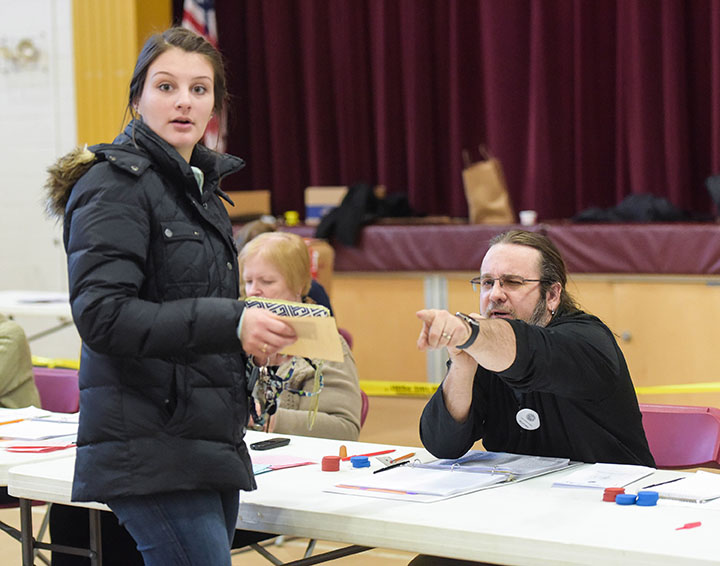The New Hampshire Primaries, and What’s Ahead
A New Hampshire voter checked in at a polling station in Manchester, N.H., on Tuesday, Feb. 9, 2016, as both Republicans and Democrats registered votes in their respective presidential primaries. (Bao Dandan/Xinhua/Sipa USA/TNS)
Coming up to Tuesday, February 9, we all thought we had the New Hampshire primaries figured out—Trump and Bernie would win, Rubio and Hillary place second, Cruz third, Kasich fourth. Others who were somehow still in the race (Bush, Christie, Carson, Fiorina, and Gilmore) would place accordingly.
But New Hampshire was a little more shocking than Iowa.
Unlike in Iowa, where most of the candidates did as the polls had suggested, everyone did either better or worse than expected.
Trump and Bernie both won big – more so than they expected. Trump came in expecting 31.2% (according to polling), and won over 35% of the Republican vote. Bernie, expecting 54.5%, left the Granite State with a whopping 60%, the largest margin of victory in New Hampshire Democratic primary history for a non-incumbent.
Kasich? Who’s Kasich? Second place in New Hampshire, that’s who. Coming into the primary, he was expecting a third place or worse finish at 13.5%, and he managed to come in second with 15.8%.
What makes this so significant is that in the history of the New Hampshire primary, no person has ever come in third or worse and still won the presidency. Only three candidates in one hundred years have ever come in second in New Hampshire and won it all. The rest came in first.
Every candidate who is not Hillary, Bernie, Kasich or Trump has an uphill battle from now on, to say the least.
As for the next few GOP candidates on the leaderboard, Cruz, who came in third, was projected fourth, and Jeb Bush, who came in fourth, was projected fifth.
Three candidates moved one spot up, so who did much worse than expected, falling three places on the leaderboard? Rubio. In the Iowa caucuses, Marco Rubio came in third, only 0.2% behind Trump, the projected victor.
That actually put Rubio at an advantage in New Hampshire—people want to vote for who’s going to win—enough so that he was at second by about 4% a mere three days before the primary. How could he have missed out on that second place spot?
Just two days before the New Hampshire primaries, Rubio “shot himself in the foot” in the Republican debate. Well, it was mostly Rubio, but Bush, Kasich, and especially Christie might have been pointing that gun at Rubio’s foot when he pulled the trigger. Christie continuously criticized Rubio for having no experience and for memorizing 25-second speeches that he had not written.
Rubio could have avoided this disaster easily if he had just changed the wording of his statements slightly and argued the repetition was intended for greater emphasis. However, when he used completely identical phrases four times, the audience was taken aback.
As for the rest of the GOP candidates, they did not have the same publicity as Rubio. Chris Christie came in tenth in Iowa after spending significant time campaigning there. He came in sixth in New Hampshire after even more relentless campaigning there, in the snow, every day. Christie dropped out of the race on February 10 after ‘taking a deep breath and thinking about his campaign’.
Carly Fiorina came out with over 4%. Fiorina also dropped out of the race on February 10 – her and Christie the first Republicans to do so after New Hampshire.
The “low-volume low-polling” Ben Carson is still in the race, perhaps contemplating a running-mate position under Trump. Or might that job go to Sarah Palin?
Oh, and Jim Gilmore was also on the leaderboard, getting 129 votes. In Iowa, he got 12—fewer than the number of people in Iowa named Jim Gilmore. In New Hampshire, his 129 votes could not even match the totals of Vermin Supreme, who wears a boot on his head and calls for a “free-pony economy.” Gilmore has since dropped out, as well (on February 12).
I predict that Carson will soon join Christie, Fiorina, and Gilmore. After that, we could see a long haul for the five remaining Republican candidates: Trump, of course; Cruz and Rubio with the support of the South; Kasich and Jeb Bush also vying for the anti-establishment spot, with Bush’s longevity aided by the $100 million in support from the Right to Rise super PAC. There is a real possibility of the first brokered convention in a very long time, for both parties.
Ben Feldman is a junior and extremely excited to be an editor of the Banner for the 2016-2017
school year! Ben started writing for the Banner his Sophomore...



